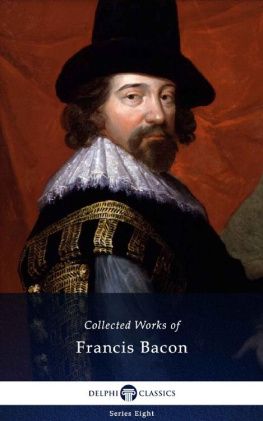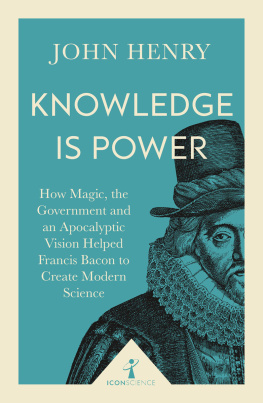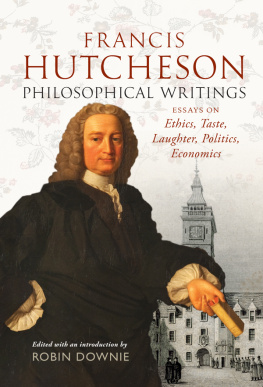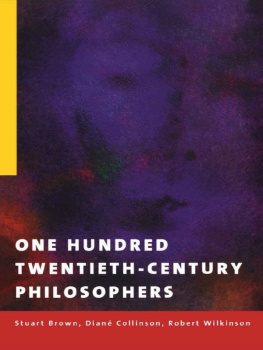Francis Bacon
Selected Philosophical Works
Francis Bacon
Selected Philosophical Works
Edited, with Introduction, by
ROSE-MARY SARGENT
Hackett Publishing Company, Inc.
Indianapolis/Cambridge
Francis Bacon: 15611626
Copyright 1999 by Hackett Publishing Company, Inc.
All rights reserved
Printed in the United States of America
12 11 10 09 08 2 3 4 5 6
For further information, please address
Hackett Publishing Company, Inc.
P. O. Box 44937
Indianapolis, Indiana 462440937
www.hackettpublishing.com
Cover design by Listenberger Design & Associates
Interior design by Meera Dash
Library of Congress Cataloging-in-Publication Data
Bacon, Francis, 15611626.
[Selections. English. 1999]
Selected philosophical works / edited, with introduction, by
Rose-Mary Sargent.
p. cm.
Includes bibliographical references and index.
ISBN 0-87220-470-7 (pbk.).ISBN 0-87220-471-5 (cloth)
1. Philosophy. 2. SciencePhilosophy. 3. Natural history.
I. Sargent, Rose-Mary. II. Title.
B1155 1999
ISBN-13: 978-0-87220-471-3 (cloth)
ISBN-13: 978-0-87220-470-6 (pbk.)
ePub ISBN: 978-1-60384-578-6
CONTENTS
Francis Bacon (15611626) led a complicated life. He was born at the time of religious reformation, political upheaval, and the intellectual and artistic flourishing of late Renaissance Europe. He became a lawyer, statesman, essayist, historian, and philosopher, who not only exemplified the values and virtues that he had inherited from the Renaissance tradition but also ushered in early conceptions of modernity. It is not possible to do justice to all of the facets of Bacons life here. What follows is a brief sketch of his legal and political career, a general account of his philosophical project, and a summary of the historical significance of his works through the twentieth century. For further reading on particular aspects of his life and thought, parenthetical references have been made to authors whose works can be found in the Selected Bibliography at the end of this volume. For general accounts of Bacons life, see the biography written by his chaplain, William Rawley, as well as the twentieth-century biographical studies by Anderson, Coquillette, Jardine and Stewart, Jones, and Zagorin. There are also some helpful collections of essays that cover a wide range of Bacons interests edited by Peltonen, Sessions, and Vickers.
LIFE AND PROFESSIONAL CAREER
Bacon was the youngest son of Nicholas Bacon, the Lord Keeper of the Great Seal under Queen Elizabeth I, and his second wife, Ann Cooke, a well-educated and devout Calvinist, who was the sister-in-law of William Cecil, Lord Burghley. When he was twelve, Francis and his older brother Anthony began a two-year residence at Trinity College, Cambridge, studying under the tutelage of Dr. John Whitgift, a future archbishop of Canterbury. In 1576 the two brothers were admitted for the study of law to Grays Inn, London; however, in order to ensure that Francis would have more practical experience, the following year his father arranged for him to accompany the English Ambassador Sir Amias Paulet to France. On the untimely death of his father in 1579, Bacon returned home and learned that he had only a slight inheritance and would thus have to acquire a profession to earn his livelihood. He took up residence in his fathers old rooms at Grays Inn and began to study the law in earnest.
His legal career began well. In 1582 he qualified for admittance to the bar as utter barrister, and in 1586 he was made bencher at Grays Inn. In 1588 he was appointed as one of four lawyers from Grays Inn to a prestigious committee of sixteen lawyers who were charged with the review of statutes for the upcoming Parliament. During this period he wrote a number of legal tracts and also contributed to popular masques, which were dramatic performances of dance, song, and dialogue with actors masked and dressed in costume, that were put on at the Inns of Court for festive occasions. In the Gesta Grayorum masque for Christmas 1594, for example, he contributed a speech on law reform, suggesting the need for more simplicity and certainty in the legal system. In 1596 he wrote his first important legal work (not published until 1631), Maxims of the Law, which contained detailed analysis and argument on how the law should be restructured (for his legal works, see Cardwell, Coquillette, Hogan and Schwartz, Kocher, McCabe, and Shapiro).
While pursuing his legal career, Bacon also embarked on an active political life. In 1581 he began government service as a member of the House of Commons for a district in Cornwall and would continue representing various areas in Commons until late in life, when he finally became a member of the House of Lords. In 1584 he wrote his first political tract, A Letter of Advice to Queen Elizabeth, wherein he discussed the danger that the presence of Catholics in England posed for the government. In 1589 he extended his critique to what he perceived to be the biases of both Anglicans and Puritans in An Advertisement Touching the Controversies of the Church of England. As these works indicate, it had become apparent by this time that the multiplication of religious sects that was begun during the Reformation often led to social unrest and thus had important political consequences. As Bacon wrote, England had become a kingdom laboring with intestine faction on account of religion (Spedding, vol. 6, p. 309). Although Queen Elizabeths father, Henry VIII, had avoided serious upheaval after his break from the Roman Catholic Church, his other daughter, Mary, who preceded Elizabeth to the throne, had created turmoil by persecuting Protestants in her failed attempt to return England to Catholicism. When Elizabeth succeeded Mary, she at first sought limited toleration, but as the years went by, she found it politically necessary to demand conformity and was thus instrumental in establishing the doctrines and rites of the Anglican Church.
Throughout the 1590s, Bacon sought to secure a political position in Elizabeths court and thus improve his financial position partly by using the help and influence of his close friend, and the Queens personal favorite, the Earl of Essex. These efforts were unsuccessful, however, perhaps largely because Bacon had lost the Queens trust when he openly opposed the taxation policies that she set forth in her Triple Subsidy Bill of 1593. Bacons relationship with Essex also provided one of the unfortunate events in his life that would subsequently lead historians to question his moral character. In 1599 Essex fell out of favor with Elizabeth after he experienced a serious defeat in Ireland. In 1601, in an ill-advised attempt to rally citizen support for his cause, Essex entered London with two hundred armed followers. This action, which was seen as a rebellion, was quickly suppressed. Essex was arrested for treason, and Bacon was called by Elizabeth to serve as the Queens advocate in the legal prosecution of the case. Essex was convicted and executed shortly thereafter. In 1601 Bacon published an account of the case in A Declaration of the Practices and Treasons Attempted and Committed by Robert, late Earl of Essex (vol. 9); then a few years later, in his 1604 work An Apology in Certain Imputations Concerning the late Earl of Essex, he attempted to justify his actions to the Earls family and friends by arguing that his was the morally correct position because he had put his duty to Queen Elizabeth ahead of his personal affection for his friend (vol. 10).
Despite what some have found to be his betrayal of Essex, Bacon still failed to win Elizabeths favor. On the death of Elizabeth in 1603 and the succession of James VI of Scotland to the throne as James I of England, Bacons political and financial fortunes began to improve. To commemorate Jamess succession, Bacon wrote
Next page












